Event Search
June 2024
Events for June 25 2024
1 Event Found

Jennifer Sey's Fight to Reclaim Title IX, Protecting Women's Sports and Spaces
September 2023
Events for August 29 2023
1 Event Found

Swimming Against the Tide: Fighting Censorship and Compelled Speech in Women's Sports
Making the University of Pennsylvania women’s swim team should have been the apex of Paula Scanlan’s competitive swimming career. Instead, she was subjected to censorship, coercion, compelled speech, and a host of other indignities, all because she didn’t think she should be required to share a locker room and compete against male swimmers like Will Thomas who transitioned and took the name Lia Thomas before joining the women’s team.
Paula and her teammates at UPenn were never asked if they were willing to share their locker room with a man. Instead, they were simply ordered to comply, coerced not to disagree with the university’s decision publicly, and told that anyone who disagreed with the policy might need mental health counseling.
Find out what swimmers like Paula Scanlan and Riley Gaines endured as they ran this gauntlet of censorship and coercion.
Events for September 29 2023
1 Event Found

Swimming Against the Tide: Fighting Censorship and Compelled Speech in Women's Sports
Making the University of Pennsylvania women’s swim team should have been the apex of Paula Scanlan’s competitive swimming career. Instead, she was subjected to censorship, coercion, compelled speech, and a host of other indignities, all because she didn’t think she should be required to share a locker room and compete against male swimmers like Will Thomas who transitioned and took the name Lia Thomas before joining the women’s team.
Paula and her teammates at UPenn were never asked if they were willing to share their locker room with a man. Instead, they were simply ordered to comply, coerced not to disagree with the university’s decision publicly, and told that anyone who disagreed with the policy might need mental health counseling.
Find out what swimmers like Paula Scanlan and Riley Gaines endured as they ran this gauntlet of censorship and coercion.
August 2022
June 2022
Events for May 29 2022
1 Event Found
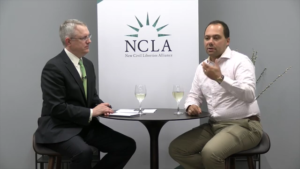
Constitutional Scholar Suspended for Months over Tweet
NCLA’s President and General Counsel Mark Chenoweth chats with Ilya Shapiro, Senior Fellow and Director of Constitutional Studies at the Manhattan Institute.
After 15 years at the Cato Institute, Shapiro was set to start new position as a Senior Lecturer at Georgetown University’s Center for the Constitution. But before he could even start, Shapiro found himself the victim of a vicious cancellation attempt from his enemies on the Left. For his sin, an innocuous if inartful tweet about a pending Supreme Court nomination, Shapiro was suspended by Georgetown and left in limbo for months.
Eventually, the dean of the law school issued a half-hearted, almost apologetic, pronouncement that Shapiro had not committed a fireable offense because he was not, at the time of the tweet, an employee of the university. But the university’s statement left no doubt that any future wrongthink would be dealt with harshly. In a move both shocking and, on second thought, completely unsurprising, Shapiro shortly thereafter announced his intention to join the Manhattan Institute, rather than start at Georgetown.
Events for June 15 2022
1 Event Found
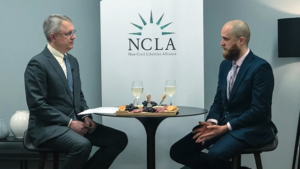
If MIT Won't Defend Science, Who Will?!
NCLA’s President and General Counsel Mark Chenoweth chats with Professor Dorian Abbot of the University of Chicago.
The Massachusetts Institute of Technology invited Prof. Abbot to give a prestigious public lecture in the fall of 2021. But then the university withdrew its invitation after some students and faculty complained about a Newsweek op-ed co-authored by Abbot. In it, he argued that many aspects of affirmative action—and especially diversity, equity, and inclusion policies—violate “the ethical and legal principle of equal treatment” and treat “people as members of a group rather than as individuals, repeating the mistake that made possible the atrocities of the 20th century.”
Events for June 29 2022
1 Event Found

Constitutional Scholar Suspended for Months over Tweet
NCLA’s President and General Counsel Mark Chenoweth chats with Ilya Shapiro, Senior Fellow and Director of Constitutional Studies at the Manhattan Institute.
After 15 years at the Cato Institute, Shapiro was set to start new position as a Senior Lecturer at Georgetown University’s Center for the Constitution. But before he could even start, Shapiro found himself the victim of a vicious cancellation attempt from his enemies on the Left. For his sin, an innocuous if inartful tweet about a pending Supreme Court nomination, Shapiro was suspended by Georgetown and left in limbo for months.
Eventually, the dean of the law school issued a half-hearted, almost apologetic, pronouncement that Shapiro had not committed a fireable offense because he was not, at the time of the tweet, an employee of the university. But the university’s statement left no doubt that any future wrongthink would be dealt with harshly. In a move both shocking and, on second thought, completely unsurprising, Shapiro shortly thereafter announced his intention to join the Manhattan Institute, rather than start at Georgetown.
December 2021
Events for December 14 2021
1 Event Found
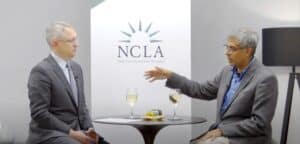
Et Tu, Stanford?! Top Epidemiologist Silenced for Following the Science
NCLA’s Executive Director and General Counsel, Mark Chenoweth, chats with Dr. Jay Bhattacharya, professor of medicine at Stanford University, research associate at the National Bureau of Economic Research, and co-author of the Great Barrington Declaration.
Dr. Bhattacharya was attacked and ridiculed in 2020 for promoting a “focused protection” strategy as an alternative to mass lockdowns. Although science and subsequent events have proven him right, Dr. Bhattacharya has been shunned and largely silenced by his home institution of Stanford University throughout 2021.
June 2021
Events for June 25 2021
1 Event Found
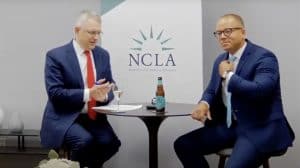
What’s the EEOC So Afraid Of?
NCLA’s Executive Director and General Counsel, Mark Chenoweth, chats with Devon Westhill, President and General Counsel at Center for Equal Opportunity. Mr. Westhill was recently invited to testify before the U.S. Equal Employment Opportunity Commission (EEOC) on the topic of “Civil Rights Implications of the COVID-19 Pandemic.”
As the former Deputy Assistant Secretary for Civil Rights for the Office of the Assistant Secretary for Civil Rights, Mr. Westhill was eminently qualified to speak on the most important civil rights issue facing the EEOC: discrimination by employers on the basis of race or sex.
Mr. Westhill sent a courtesy copy of the testimony he planned to give, but then an all-too-familiar thing happened. The EEOC disinvited him, saying his testimony was too strident in its denunciation of corporations, like Coca-Cola and United Airlines, who discriminate on the basis of race and sex. Members of the EEOC staff told Westhill they did not care for his testimony’s “aggressive tone” or corporate “name-checking.”
What did he plan to say that was so explosive?
Jennifer Sey's Fight to Reclaim Title IX, Protecting Women's Sports and Spaces
Jennifer Sey went from national champion gymnast in 1986 to being vilified 22 years later for blowing the whistle on the rampant abuse in national women’s gymnastics. Ten years later, she lost her job as a top executive at Levi’s for speaking out on the harm to children caused by pandemic school closures. But this is a woman who does not back down. Which is why Jennifer has founded her own clothing company, XX+XY Athletics. In her words, she “teamed up with a rag-tag group of canceled, ousted and self-described misfits. And … created an athletic brand that would stand for the truth and America’s highest ideals: equality of opportunity, freedom of speech, open debate and dissent and striving for excellence.” Tune in as Mark Chenoweth and Jenin Younes chat with this fascinating iconoclast, discussing her journey from a women’s athletic champion to a champion for women’s athletics.

Jennifer Sey's Fight to Reclaim Title IX, Protecting Women's Sports and Spaces
Jennifer Sey went from national champion gymnast in 1986 to being vilified 22 years later for blowing the whistle on the rampant abuse in national women’s gymnastics. Ten years later, she lost her job as a top executive at Levi’s for speaking out on the harm to children caused by pandemic school closures. But this is a woman who does not back down. Which is why Jennifer has founded her own clothing company, XX+XY Athletics. In her words, she “teamed up with a rag-tag group of canceled, ousted and self-described misfits. And … created an athletic brand that would stand for the truth and America’s highest ideals: equality of opportunity, freedom of speech, open debate and dissent and striving for excellence.” Tune in as Mark Chenoweth and Jenin Younes chat with this fascinating iconoclast, discussing her journey from a women’s athletic champion to a champion for women’s athletics.
Swimming Against the Tide: Fighting Censorship and Compelled Speech in Women's Sports
Making the University of Pennsylvania women’s swim team should have been the apex of Paula Scanlan’s competitive swimming career. Instead, she was subjected to censorship, coercion, compelled speech, and a host of other indignities, all because she didn’t think she should be required to share a locker room and compete against male swimmers like Will Thomas who transitioned and took the name Lia Thomas before joining the women’s team.
Paula and her teammates at UPenn were never asked if they were willing to share their locker room with a man. Instead, they were simply ordered to comply, coerced not to disagree with the university’s decision publicly, and told that anyone who disagreed with the policy might need mental health counseling.
Find out what swimmers like Paula Scanlan and Riley Gaines endured as they ran this gauntlet of censorship and coercion.

Swimming Against the Tide: Fighting Censorship and Compelled Speech in Women's Sports
Making the University of Pennsylvania women’s swim team should have been the apex of Paula Scanlan’s competitive swimming career. Instead, she was subjected to censorship, coercion, compelled speech, and a host of other indignities, all because she didn’t think she should be required to share a locker room and compete against male swimmers like Will Thomas who transitioned and took the name Lia Thomas before joining the women’s team.
Paula and her teammates at UPenn were never asked if they were willing to share their locker room with a man. Instead, they were simply ordered to comply, coerced not to disagree with the university’s decision publicly, and told that anyone who disagreed with the policy might need mental health counseling.
Find out what swimmers like Paula Scanlan and Riley Gaines endured as they ran this gauntlet of censorship and coercion.
Thoughtcrimes Trump Tenure at Princeton: Professor Terminated for Expressing the Wrong Opinion
Professor Katz’ troubles began when he had the temerity to express the wrong opinion: He criticized a campus group, the Black Justice League, in response to a list of racialist demands made during the tumultuous summer of 2020. Before he knew it, his employer was digging through his past, looking for a pretense it could use to terminate him. And, having found what it was looking for in an infraction from 15 years ago, Princeton unceremoniously fired a tenured professor. This is another sad instance of institutions excavating past wrongs to expunge the moral stain of expressing an unorthodox opinion. And it could mark the nadir of free speech on campus.
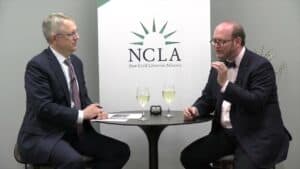
Thoughtcrimes Trump Tenure at Princeton: Professor Terminated for Expressing the Wrong Opinion
Professor Katz’ troubles began when he had the temerity to express the wrong opinion: He criticized a campus group, the Black Justice League, in response to a list of racialist demands made during the tumultuous summer of 2020. Before he knew it, his employer was digging through his past, looking for a pretense it could use to terminate him. And, having found what it was looking for in an infraction from 15 years ago, Princeton unceremoniously fired a tenured professor. This is another sad instance of institutions excavating past wrongs to expunge the moral stain of expressing an unorthodox opinion. And it could mark the nadir of free speech on campus.
Constitutional Scholar Suspended for Months over Tweet
NCLA’s President and General Counsel Mark Chenoweth chats with Ilya Shapiro, Senior Fellow and Director of Constitutional Studies at the Manhattan Institute.
After 15 years at the Cato Institute, Shapiro was set to start new position as a Senior Lecturer at Georgetown University’s Center for the Constitution. But before he could even start, Shapiro found himself the victim of a vicious cancellation attempt from his enemies on the Left. For his sin, an innocuous if inartful tweet about a pending Supreme Court nomination, Shapiro was suspended by Georgetown and left in limbo for months.
Eventually, the dean of the law school issued a half-hearted, almost apologetic, pronouncement that Shapiro had not committed a fireable offense because he was not, at the time of the tweet, an employee of the university. But the university’s statement left no doubt that any future wrongthink would be dealt with harshly. In a move both shocking and, on second thought, completely unsurprising, Shapiro shortly thereafter announced his intention to join the Manhattan Institute, rather than start at Georgetown.

Constitutional Scholar Suspended for Months over Tweet
NCLA’s President and General Counsel Mark Chenoweth chats with Ilya Shapiro, Senior Fellow and Director of Constitutional Studies at the Manhattan Institute.
After 15 years at the Cato Institute, Shapiro was set to start new position as a Senior Lecturer at Georgetown University’s Center for the Constitution. But before he could even start, Shapiro found himself the victim of a vicious cancellation attempt from his enemies on the Left. For his sin, an innocuous if inartful tweet about a pending Supreme Court nomination, Shapiro was suspended by Georgetown and left in limbo for months.
Eventually, the dean of the law school issued a half-hearted, almost apologetic, pronouncement that Shapiro had not committed a fireable offense because he was not, at the time of the tweet, an employee of the university. But the university’s statement left no doubt that any future wrongthink would be dealt with harshly. In a move both shocking and, on second thought, completely unsurprising, Shapiro shortly thereafter announced his intention to join the Manhattan Institute, rather than start at Georgetown.
If MIT Won't Defend Science, Who Will?!
NCLA’s President and General Counsel Mark Chenoweth chats with Professor Dorian Abbot of the University of Chicago.
The Massachusetts Institute of Technology invited Prof. Abbot to give a prestigious public lecture in the fall of 2021. But then the university withdrew its invitation after some students and faculty complained about a Newsweek op-ed co-authored by Abbot. In it, he argued that many aspects of affirmative action—and especially diversity, equity, and inclusion policies—violate “the ethical and legal principle of equal treatment” and treat “people as members of a group rather than as individuals, repeating the mistake that made possible the atrocities of the 20th century.”

If MIT Won't Defend Science, Who Will?!
NCLA’s President and General Counsel Mark Chenoweth chats with Professor Dorian Abbot of the University of Chicago.
The Massachusetts Institute of Technology invited Prof. Abbot to give a prestigious public lecture in the fall of 2021. But then the university withdrew its invitation after some students and faculty complained about a Newsweek op-ed co-authored by Abbot. In it, he argued that many aspects of affirmative action—and especially diversity, equity, and inclusion policies—violate “the ethical and legal principle of equal treatment” and treat “people as members of a group rather than as individuals, repeating the mistake that made possible the atrocities of the 20th century.”
Et Tu, Stanford?! Top Epidemiologist Silenced for Following the Science
NCLA’s Executive Director and General Counsel, Mark Chenoweth, chats with Dr. Jay Bhattacharya, professor of medicine at Stanford University, research associate at the National Bureau of Economic Research, and co-author of the Great Barrington Declaration.
Dr. Bhattacharya was attacked and ridiculed in 2020 for promoting a “focused protection” strategy as an alternative to mass lockdowns. Although science and subsequent events have proven him right, Dr. Bhattacharya has been shunned and largely silenced by his home institution of Stanford University throughout 2021.

Et Tu, Stanford?! Top Epidemiologist Silenced for Following the Science
NCLA’s Executive Director and General Counsel, Mark Chenoweth, chats with Dr. Jay Bhattacharya, professor of medicine at Stanford University, research associate at the National Bureau of Economic Research, and co-author of the Great Barrington Declaration.
Dr. Bhattacharya was attacked and ridiculed in 2020 for promoting a “focused protection” strategy as an alternative to mass lockdowns. Although science and subsequent events have proven him right, Dr. Bhattacharya has been shunned and largely silenced by his home institution of Stanford University throughout 2021.
